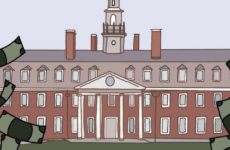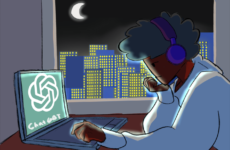When I arrived at Choate, I not only learned the roots of the Spanish-American war, the advantages and disadvantages of free trade, and the conjugation of Arabic verbs, but also the importance of creating and sustaining conversations. I’m not referring to conversations with your best friend about the new PGs on campus or about good T.V. shows. I’m referring to more substantial, more candid, and more profound discussions.
But here’s the thing: it seems to me that when such conversations occur (and they do, frequently), they’re initiated by the same group of students. Do you know who I’m talking about? Walk into any SAGE, SMASS, or CDSA meeting, and you’ll see a familiar set of faces sharing opinions. These are the same people who initiate conversations about gender equality in the Dining Hall. This group comprises only a small portion of the Choate community, and the rest of us, students and faculty alike, remain on the periphery. It might be true that the larger Choate community is aware that it is important to talk about issues related to gender (we spend hours talking about diversity at the annual Diversity Day and listen to nationally renowned scholars and activists such as Rosalind Wiseman). But the entire Choate community does not regularly engage in serious conversations. Oh, how much easier it is to keep one’s head down.
One hindrance seems to be the fear of offending others. Those who aren’t as involved in these conversations – people such as myself, I admit – worry that they might offend a particular body of people, especially those in the LGBTQ community. Ask anyone around Choate’s campus about the difference between the terms “transsexual” and “transgender” – chances are, 8 out of 10 people won’t know the answer. The education we receive at Choate is, to a certain extent, the problem. Perhaps we are trained to be too sensitive. However, the greater problem is that these people who aren’t as knowledgeable about gender are too scared to be politically incorrect.
Political correctness (P.C.) has found its way into the lives of Choate students, and its culture engenders fear and frustration to those who want to actively participate in conversations about these issues. Students find themselves unable to participate in discussions because they fear offending those who identify with a certain gender or sexuality.
Let’s take a look at my own knowledge of gender and sexuality, which, to be candid, is rather thin. Before Choate, I had a vague idea of what the acronym LGBTQ stood for; all I knew was the difference between gay and lesbian. When I came to Choate, I was determined to know more. I went out of my way to ask people who were more educated in those areas, even if it meant I was asking simple questions, such as, “What does queer mean exactly?” or “Um, so what does bisexual mean?” Though asking those questions made me seem ignorant, I forced myself to stretch my comfort zone and ask them. I also forced myself to voice my opinions to friends, even if it meant unintentionally using incorrect terminology. I wasn’t focused on the criticisms I would receive by not using the proper terminology. Forgetting P.C. culture for a moment, I tried to use my weakness as a strength, as an avenue to engage in an important dialogue.
I’m not decrying P.C. culture — in many ways, it’s a positive force. Last week, for instance, Esul Burton ’16 used this space to examine today’s war on political correctness. According to Burton, political correctness is “treating other people with the dignity they deserve. It’s about being aware of other people’s experiences, respecting those experiences by using tolerant and understanding language, and creating a society that is welcoming to those that have often been at its fringes. In short, political correctness is all about being sensitive.” I agree that Choate students should be sensitive towards others, regardless of their race, socio-economic status, gender, and other distinguishing traits. However, P.C. culture can be intimidating to those who aren’t as educated about certain issues but want to be involved. The prevalence of P.C. culture can effectively silence the majority of people who want to take on an active role in these conversations.
What is my solution? Have good intentions, speak your mind, and don’t be afraid to use incorrect terminology. Play an active role in these conversations, even if you fear judgment from others or if you fear offending a close friend. It’s possible to be sensitive without using always using the correct terminology. Those who are always at the forefront of these conversations, especially at Choate, seek the support of the periphery. And these people will open their arms to educate you.
Those who reside on the edges must lean into the discussion. Be sensitive; you’ll become much more educated in these issues that are very pertinent today.




